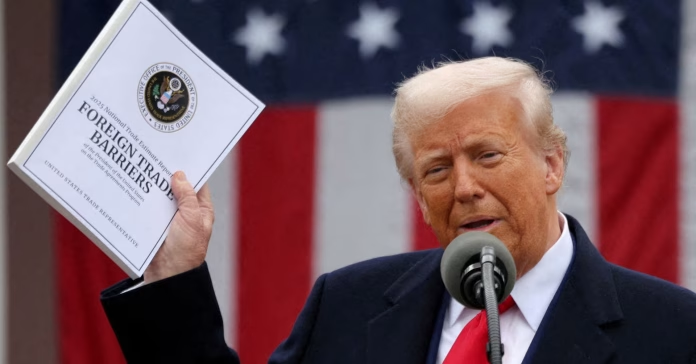. . . but unionist claims 11 upbeat factories promise to re-open next month
Mathatisi Sebusi
THE government has expressed dissatisfaction with the recently reduced 15 percent tariffs imposed on Lesotho’s exports to the United States.
While 15 percent is a much softer tariff regime compared with the expected 50 percent tariff threshold, Maseru still argues that the new rate still leaves the country hamstrung among its competitors, which will render many textile factories unviable and lead to massive job losses.
Minister of Trade, Industry and Business Development, Mokhethi Shelile, on Friday this week welcomed the tariff reduction from the initial 50 percent but expressed concern that Lesotho still faces an uphill battle to match competitors in the sector whose countries’ exports are subject to a lower tariff of 10 percent.
He said that although the government cannot currently afford to subsidise the remaining five percent gap, it remains committed to further negotiations with the US administration.
“The government of Lesotho has been engaging with the United States administration regarding the revision of the 50 percent tariffs, which were too high to allow Lesotho’s products meaningful access to the American market,” Mr Shelile said.
“These engagements were carried out by the Government of Lesotho and the US Embassy in Maseru. Additional negotiations were conducted by the Lesotho Embassy in Washington.”
He said a delegation led by the Minister of Finance and Development Planning had met with senior officials in Washington, and that he himself had held virtual meetings and exchanged information directly with the US Trade Representative.
“As a result of these combined efforts, we were assured that the 50 percent tariff rate would be reconsidered. We are pleased that our negotiations have yielded positive results.”
However, Mr Shelile said more work remains outstanding.
“We remain committed to pushing for a further reduction to the minimum tariff level of 10 percent, which is essential for our textile sector to compete effectively in the US market. I have already communicated with the US Embassy regarding continued negotiations. The recent reduction gives us hope that we will eventually reach our target.
“Our aim is to negotiate until we secure the lowest possible tariff rates, which will enable us to compete with other countries.
“In addition to negotiations, we will collaborate with the sector to explore ways to ease the burden of tariffs. However, subsidies are not an option at this time.”
The tariffs were initially introduced during a state of emergency declared by US President Donald Trump, which saw the suspension of various trade laws, including the under the African Growth and Opportunity Act (AGOA).
The Act, enacted in 2000, has been a vital instrument in facilitating duty-free access for over 1800 products from eligible sub-Saharan African countries, including Lesotho, into the US market.
Chairperson of the Lesotho Textile Exporters, David Chen, echoed the government’s concerns, saying the 15 percent tariff does little to improve the competitiveness of Lesotho’s textile sector in the global market.
“The reduction of tariffs from 50 percent to 15 percent does not make any difference or address the challenges currently facing the textile industry.
“This is because other countries which we are competing against are already being charged 10 percent, which makes it difficult for us to compete on an equal footing.
“Buyers are the ones who bear the burden of these tariffs and, naturally, they will choose to source goods elsewhere where prices are lower.
“As a result, many factories will have to shut down. They had already been forced to lay off workers when the tariffs were first announced in April. The problem remains unresolved. We are planning to meet with the government to urge it to take further steps and push for the tariffs to be dropped, if possible to zero.”
Mr Chen cited Kenya as their strongest competitor in the sector. Given that the Trump administration pegged tariffs for Kenya at 10 percent, Mr Chen said this means textile sector players in Lesotho will not match their counterparts in the East African country.
However, the Independent Democratic Union of Lesotho (IDUL) has accused employers of being disingenuous and driven by self-interest rather than national development.
“Employers who are complaining are only thinking about themselves,” said IDUL General Secretary, May Rathakane.
“This reduction is a milestone, especially since the government made no effort to negotiate. Eleven factories we have spoken to have welcomed the tariff decrease and committed to reopening and resuming operations, even if gradually.”
Mr Rathakane said factory owners have assured the union that they are sourcing buyers and materials, with plans to begin recalling workers by September.
He dismissed calls for a 10 percent tariff rate as unrealistic, noting that only three countries globally enjoy such rates.
“The 11 firms affected by the tariffs and employing around 12,000 workers are optimistic about the reduction and eager to restart operations,” he said.
The ongoing debate highlights the tension between employers’ concerns over market competitiveness and unions’ focus on job recovery and stability.
As negotiations continue, the government’s ability to strike a balance between these interests will be critical for the future of Lesotho’s textile industry.


